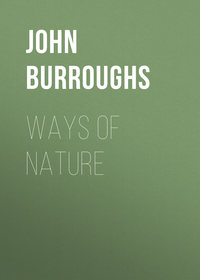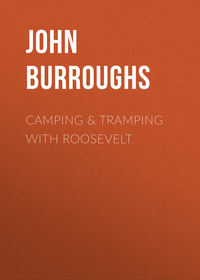 полная версия
полная версияRiverby
The chipmunk is quite a solitary creature; I have never known more than one to occupy the same den. Apparently no two can agree to live together. What a clean, pert, dapper, nervous little fellow he is! How fast his heart beats, as he stands up on the wall by the roadside, and, with hands spread out upon his breast, regards you intently! A movement of your arm, and he darts into the wall with a saucy chip-r-r, which has the effect of slamming the door behind him.
On some still day in autumn, the nutty days, the woods will often be pervaded by an undertone of sound, produced by their multitudinous clucking, as they sit near their dens. It is one of the characteristic sounds of fall.
The chipmunk has many enemies, such as cats, weasels, black snakes, hawks, and owls. One season one had his den in the side of the bank near my study. As I stood regarding his goings and comings, one October morning, I saw him, when a few yards away from his hole, turn and retreat with all speed. As he darted beneath the sod, a shrike swooped down and hovered a moment on the wing just over the hole where he had disappeared. I doubt if the shrike could have killed him, but it certainly gave him a good fright.
It was amusing to watch this chipmunk carry nuts and other food into his den. He had made a well-defined path from his door out through the weeds and dry leaves into the territory where his feeding-ground lay. The path was a crooked one; it dipped under weeds, under some large, loosely piled stones, under a pile of chestnut posts, and then followed the remains of an old wall. Going and coming, his motions were like clockwork. He always went by spurts and sudden sallies. He was never for one moment off his guard. He would appear at the mouth of his den, look quickly about, take a few leaps to a tussock of grass, pause a breath with one foot raised, slip quickly a few yards over some dry leaves, pause again by a stump beside a path, rush across the path to the pile of loose stones, go under the first and over the second, gain the pile of posts, make his way through that, survey his course a half moment from the other side of it, and then dart on to some other cover, and presently beyond my range, where I think he gathered acorns, as there were no other nut-bearing trees than oaks near. In four or five minutes I would see him coming back, always keeping rigidly to the course he took going out, pausing at the same spots, darting over or under the same objects, clearing at a bound the same pile of leaves. There was no variation in his manner of proceeding all the time I observed him.
He was alert, cautious, and exceedingly methodical. He had found safety in a certain course, and he did not at any time deviate a hair's breadth from it. Something seemed to say to him all the time, "Beware, beware!" The nervous, impetuous ways of these creatures are no doubt the result of the life of fear which they lead.
My chipmunk had no companion. He lived all by himself in true hermit fashion, as is usually the case with this squirrel. Provident creature that he is, one would think that he would long ago have discovered that heat, and therefore food, is economized by two or three nesting together.
One day in early spring, a chipmunk that lived near me met with a terrible adventure, the memory of which will probably be handed down through many generations of its family. I was sitting in the summer-house with Nig the cat upon my knee, when the chipmunk came out of its den a few feet away, and ran quickly to a pile of chestnut posts about twenty yards from where I sat. Nig saw it, and was off my lap upon the floor in an instant. I spoke sharply to the cat, when she sat down and folded her paws under her, and regarded the squirrel, as I thought, with only a dreamy kind of interest. I fancied she thought it a hopeless case there amid that pile of posts. "That is not your game, Nig," I said, "so spare yourself any anxiety." Just then I was called to the house, where I was detained about five minutes. As I returned I met Nig coming to the house with the chipmunk in her mouth. She had the air of one who had won a wager. She carried the chipmunk by the throat, and its body hung limp from her mouth. I quickly took the squirrel from her, and reproved her sharply. It lay in my hand as if dead, though I saw no marks of the cat's teeth upon it. Presently it gasped for its breath, then again and again. I saw that the cat had simply choked it. Quickly the film passed off its eyes, its heart began visibly to beat, and slowly the breathing became regular. I carried it back, and laid it down in the door of its den. In a moment it crawled or kicked itself in. In the afternoon I placed a handful of corn there, to express my sympathy, and as far as possible make amends for Nig's cruel treatment.
Not till four or five days had passed did my little neighbor emerge again from its den, and then only for a moment. That terrible black monster with the large green-yellow eyes, – it might be still lurking near. How the black monster had captured the alert and restless squirrel so quickly, under the circumstances, was a great mystery to me. Was not its eye as sharp as the cat's, and its movements as quick? Yet cats do have the secret of catching squirrels, and birds, and mice, but I have never yet had the luck to see it done.
It was not very long before the chipmunk was going to and from her den as usual, though the dread of the black monster seemed ever before her, and gave speed and extra alertness to all her movements. In early summer four young chipmunks emerged from the den, and ran freely about. There was nothing to disturb them, for, alas! Nig herself was now dead.
One summer day I watched a cat for nearly a half hour trying her arts upon a chipmunk that sat upon a pile of stone. Evidently her game was to stalk him. She had cleared half the distance, or about twelve feet, that separated the chipmunk from a dense Norway spruce, when I chanced to become a spectator of the little drama. There sat the cat crouched low on the grass, her big, yellow eyes fixed upon the chipmunk, and there sat the chipmunk at the mouth of his den, motionless, with his eye fixed upon the cat. For a long time neither moved. "Will the cat bind him with her fatal spell?" I thought. Sometimes her head slowly lowered and her eyes seemed to dilate, and I fancied she was about to spring. But she did not. The distance was too great to be successfully cleared in one bound. Then the squirrel moved nervously, but kept his eye upon the enemy. Then the cat evidently grew tired and relaxed a little and looked behind her. Then she crouched again and riveted her gaze upon the squirrel. But the latter would not be hypnotized; it shifted its position a few times and finally quickly entered its den, when the cat soon slunk away.
In digging his hole it is evident that the chipmunk carries away the loose soil. Never a grain of it is seen in front of his door. Those pockets of his probably stand him in good stead on such occasions. Only in one instance have I seen a pile of earth before the entrance to a chipmunk's den, and that was where the builder had begun his house late in November, and was probably too much hurried to remove this ugly mark from before his door. I used to pass his place every morning in my walk, and my eye always fell upon that little pile of red, freshly dug soil. A little later I used frequently to surprise the squirrel furnishing his house, carrying in dry leaves of the maple and plane tree. He would seize a large leaf and with both hands stuff it into his cheek pockets, and then carry it into his den. I saw him on several different days occupied in this way. I trust he had secured his winter stores, though I am a little doubtful. He was hurriedly making himself a new home, and the cold of December was upon us while he was yet at work. It may be that he had moved the stores from his old quarters, wherever they were, and again it may be that he had been dispossessed of both his house and provender by some other chipmunk.
When nuts or grain are not to be had, these thrifty little creatures will find some substitute to help them over the winter. Two chipmunks near my study were occupied many days in carrying in cherry pits which they gathered beneath a large cherry-tree that stood ten or twelve rods away. As Nig was no longer about to molest them, they grew very fearless, and used to spin up and down the garden path to and from their source of supplies in a way quite unusual with these timid creatures. After they had got enough cherry pits, they gathered the seed of a sugar maple that stood near. Many of the keys remained upon the tree after the leaves had fallen, and these the squirrels harvested. They would run swiftly out upon the ends of the small branches, reach out for the maple keys, snip off the wings, and deftly slip the nut or samara into their cheek pockets. Day after day in late autumn, I used to see them thus occupied.
As I have said, I have no evidence that more than one chipmunk occupy the same den. One March morning after a light fall of snow I saw where one had come up out of his hole, which was in the side of our path to the vineyard, and after a moment's survey of the surroundings had started off on his travels. I followed the track to see where he had gone. He had passed through my woodpile, then under the beehives, then around the study and under some spruces and along the slope to the hole of a friend of his, about sixty yards from his own. Apparently he had gone in here, and then his friend had come forth with him, for there were two tracks leading from this doorway. I followed them to a third humble entrance, not far off, where the tracks were so numerous that I lost the trail. It was pleasing to see the evidence of their morning sociability written there upon the new snow.
One of the enemies of the chipmunk, as I discovered lately, is the weasel. I was sitting in the woods one autumn day when I heard a small cry, and a rustling amid the branches of a tree a few rods beyond me. Looking thither I saw a chipmunk fall through the air, and catch on a limb twenty or more feet from the ground. He appeared to have dropped from near the top of the tree.
He secured his hold upon the small branch that had luckily intercepted his fall, and sat perfectly still. In a moment more I saw a weasel – one of the smaller red varieties – come down the trunk of the tree, and begin exploring the branches on a level with the chipmunk.
I saw in a moment what had happened. The weasel had driven the squirrel from his retreat in the rocks and stones beneath, and had pressed him so closely that he had taken refuge in the top of a tree. But weasels can climb trees, too, and this one had tracked the frightened chipmunk to the topmost branch, where he had tried to seize him. Then the squirrel had, in horror, let go his hold, screamed, and fallen through the air, till he struck the branch as just described. Now his bloodthirsty enemy was looking for him again, apparently relying entirely upon his sense of smell to guide him to the game.
How did the weasel know the squirrel had not fallen clear to the ground? He certainly did know, for when he reached the same tier of branches he began exploring them. The chipmunk sat transfixed with fear, frozen with terror, not twelve feet away, and yet the weasel saw him not.
Round and round, up and down, he went on the branches, exploring them over and over. How he hurried, lest the trail get cold! How subtle and cruel and fiendish he looked! His snakelike movements, his tenacity, his speed!
He seemed baffled; he knew his game was near, but he could not strike the spot. The branch, upon the extreme end of which the squirrel sat, ran out and up from the tree seven or eight feet, and then, turning a sharp elbow, swept down and out at right angles with its first course.
The weasel would pause each time at this elbow and turn back. It seemed as if he knew that particular branch held his prey, and yet its crookedness each time threw him out. He would not give it up, but went over his course again and again.
One can fancy the feelings of the chipmunk, sitting there in plain view a few feet away, watching its deadly enemy hunting for the clew. How its little heart must have fairly stood still each time the fatal branch was struck! Probably as a last resort it would again have let go its hold and fallen to the ground, where it might have eluded its enemy a while longer.
In the course of five or six minutes the weasel gave over the search, and ran hurriedly down the tree to the ground. The chipmunk remained motionless for a long time; then he stirred a little as if hope was reviving. Then he looked nervously about him; then he had recovered himself so far as to change his position. Presently he began to move cautiously along the branch to the bole of the tree; then, after a few moments' delay, he plucked up courage to descend to the ground, where I hope no weasel has disturbed him since.
IX
SPRING JOTTINGS
For ten or more years past I have been in the habit of jotting down, among other things in my note-book, observations upon the seasons as they passed, – the complexion of the day, the aspects of nature, the arrival of the birds, the opening of the flowers, or any characteristic feature of the passing moment or hour which the great open-air panorama presented. Some of these notes and observations touching the opening and the progress of the spring season follow herewith.
I need hardly say they are off-hand and informal; what they have to recommend them to the general reader is mainly their fidelity to actual fact. The sun always crosses the line on time, but the seasons which he makes are by no means so punctual; they loiter or they hasten, and the spring tokens are three or four weeks earlier or later some seasons than others. The ice often breaks up on the river early in March, but I have crossed upon it as late as the 10th of April. My journal presents many samples of both early and late springs.
But before I give these extracts let me say a word or two in favor of the habit of keeping a journal of one's thoughts and days. To a countryman, especially of a meditative turn, who likes to preserve the flavor of the passing moment, or to a person of leisure anywhere, who wants to make the most of life, a journal will be found a great help. It is a sort of deposit account wherein one saves up bits and fragments of his life that would otherwise be lost to him.
What seemed so insignificant in the passing, or as it lay in embryo in his mind, becomes a valuable part of his experiences when it is fully unfolded and recorded in black and white. The process of writing develops it; the bud becomes the leaf or flower; the one is disentangled from the many and takes definite form and hue. I remember that Thoreau says in a letter to a friend, after his return from a climb to the top of Monadnock, that it is not till he gets home that he really goes over the mountain; that is, I suppose, sees what the climb meant to him when he comes to write an account of it to his friend. Every one's experience is probably much the same; when we try to tell what we saw and felt, even to our journals, we discover more and deeper meanings in things than we had suspected.
The pleasure and value of every walk or journey we take may be doubled to us by carefully noting down the impressions it makes upon us. How much of the flavor of Maine birch I should have missed had I not compelled that vague, unconscious being within me, who absorbs so much and says so little, to unbosom himself at the point of the pen! It was not till after I got home that I really went to Maine, or to the Adirondacks, or to Canada. Out of the chaotic and nebulous impressions which these expeditions gave me, I evolved the real experience. There is hardly anything that does not become much more in the telling than in the thinking or in the feeling.
I see the fishermen floating up and down the river above their nets, which are suspended far out of sight in the water beneath them. They do not know what fish they have got, if any, till after a while they lift the nets up and examine them. In all of us there is a region of sub-consciousness above which our ostensible lives go forward, and in which much comes to us, or is slowly developed, of which we are quite ignorant until we lift up our nets and inspect them.
Then the charm and significance of a day are so subtle and fleeting! Before we know it, it is gone past all recovery. I find that each spring, that each summer and fall and winter of my life, has a hue and quality of its own, given by some prevailing mood, a train of thought, an event, an experience, – a color or quality of which I am quite unconscious at the time, being too near to it, and too completely enveloped by it. But afterward some mood or circumstance, an odor, or fragment of a tune, brings it back as by a flash; for one brief second the adamantine door of the past swings open and gives me a glimpse of my former life. One's journal, dashed off without any secondary motive, may often preserve and renew the past for him in this way.
These leaves from my own journal are not very good samples of this sort of thing, but they preserve for me the image of many a day which memory alone could never have kept.
March 3, 1879. The sun is getting strong, but winter still holds his own. No hint of spring in the earth or air. No sparrow or sparrow song yet. But on the 5th there was a hint of spring. The day warm and the snow melting. The first bluebird note this morning. How sweetly it dropped down from the blue overhead!
March 10. A real spring day at last, and a rouser! Thermometer between fifty and sixty degrees in the coolest spot; bees very lively about the hive, and working on the sawdust in the wood-yard; how they dig and wallow in the woody meal, apparently squeezing it as if forcing it to yield up something to them! Here they get their first substitute for pollen. The sawdust of hickory and maple is preferred. The inner milky substance between the bark and the wood, called the cambium layer, is probably the source of their supplies.
In the growing tree it is in this layer or secretion that the vital processes are the most active and potent. It has been found by experiment that this tender, milky substance is capable of exerting a very great force; a growing tree exerts a lifting and pushing force of more than thirty pounds to the square inch, and the force is thought to reside in the soft fragile cells that make up the cambium layer. It is like the strength of Samson residing in his hair. Saw one bee enter the hive with pollen on his back, which he must have got from some open greenhouse; or had he found the skunk cabbage in bloom ahead of me?
The bluebirds! It seemed as if they must have been waiting somewhere close by for the first warm day, like actors behind the scenes, for they were here in numbers early in the morning; they rushed upon the stage very promptly when their parts were called. No robins yet. Sap runs, but not briskly. It is too warm and still; it wants a brisk day for sap, with a certain sharpness in the air, a certain crispness and tension.
March 12. A change to more crispness and coolness, but a delicious spring morning. Hundreds of snowbirds with a sprinkling of song and Canada sparrows are all about the house, chirping and lisping and chattering in a very animated manner. The air is full of bird voices: through this maze of fine sounds comes the strong note and warble of the robin, and the soft call of the bluebird. A few days ago not a bird, not a sound; everything rigid and severe; then in a day the barriers of winter give way, and spring comes like an inundation. In a twinkling all is changed.
Under date of February 27, 1881, I find this note: "Warm; saw the male bluebird warbling and calling cheerily. The male bluebird spreads his tail as he flits about at this season, in a way to make him look very gay and dressy. It adds to his expression considerably, and makes him look alert and beau-like, and every inch a male. The grass is green under the snow, and has grown perceptibly. The warmth of the air seems to go readily through a covering of ice and snow. Note how quickly the ice lets go of the door-stones, though completely covered, when the day becomes warm."
The farmers say a deep snow draws the frost out of the ground. It is certain that the frost goes out when the ground is deeply covered for some time, though it is of course the warmth rising up from the depths of the ground that does it. A winter of deep snows is apt to prove fatal to the peach buds. The frost leaves the ground, the soil often becomes so warm that angle-worms rise to near the surface, the sap in the trees probably stirs a little; then there comes a cold wave, the mercury goes down to ten or fifteen below zero, and the peach buds are killed. It is not the cold alone that does it; it is the warmth at one end and the extreme cold at the other. When the snow is removed so that the frost can get at the roots also, peach buds will stand fourteen or fifteen degrees below zero.
March 7, 1881. A perfect spring day at last, – still, warm, and without a cloud. Tapped two trees; the sap runs, the snow runs, everything runs. Bluebirds the only birds yet. Thermometer forty-two degrees in the shade. A perfect sap day. A perfect sap day is a crystalline day; the night must have a keen edge of frost, and the day a keen edge of air and sun, with wind north or northwest. The least film, the least breath from the south, the least suggestion of growth, and the day is marred as a sap day. Maple sap is maple frost melted by the sun. (9 P. M.) A soft, large-starred night; the moon in her second quarter; perfectly still and freezing; Venus throbbing low in the west. A crystalline night.
March 21, 1884. The top of a high barometric wave, a day like a crest, lifted up, sightly, sparkling. A cold snap without storm issuing in this clear, dazzling, sharp, northern day. How light, as if illuminated by more than the sun; the sky is full of light; light seems to be streaming up all around the horizon. The leafless trees make no shadows; the woods are flooded with light; everything shines; a day large and imposing, breathing strong masculine breaths out of the north; a day without a speck or film, winnowed through and through, all the windows and doors of the sky open. Day of crumpled rivers and lakes, of crested waves, of bellying sails, high-domed and lustrous day. The only typical March day of the bright heroic sort we have yet had.
March 24, 1884. Damp, still morning, much fog on the river. All the branches and twigs of the trees strung with drops of water. The grass and weeds beaded with fog drops. Two lines of ducks go up the river, one a few feet beneath the other. On second glance the under line proves to be the reflection of the other in the still water. As the ducks cross a large field of ice, the lower line is suddenly blotted out, as if the birds had dived beneath the ice. A train of cars across the river, – the train sunk beneath a solid stratum of fog, its plume of smoke and vapor unrolling above it and slanting away in the distance; a liquid morning; the turf buzzes as you walk over it.
Skunk cabbage on Saturday the 22d, probably in bloom several days. This plant always gets ahead of me. It seems to come up like a mushroom in a single night. Water newts just out, and probably piping before the frogs, though not certain about this.
March 25. One of the rare days that go before a storm; the flower of a series of days increasingly fair. To-morrow, probably, the flower falls, and days of rain and cold prepare the way for another fair day or days. The barometer must be high to-day; the birds fly high. I feed my bees on a rock, and sit long and watch them covering the combs, and rejoice in the multitudinous humming. The river is a great mirror dotted here and there by small cakes of ice. The first sloop comes lazily up on the flood tide, like the first butterfly of spring; the little steamer, our river omnibus, makes her first trip, and wakes the echoes with her salutatory whistle, her flags dancing in the sun.
April 1. Welcome to April, my natal month; the month of the swelling buds, the springing grass, the first nests, the first plantings, the first flowers, and, last but not least, the first shad! The door of the seasons first stands ajar this month, and gives us a peep beyond. The month in which to begin the world, in which to begin your house, in which to begin your courtship, in which to enter upon any new enterprise. The bees usually get their first pollen this month and their first honey. All hibernating creatures are out before April is past. The coon, the chipmunk, the bear, the turtles, the frogs, the snakes, come forth beneath April skies.









